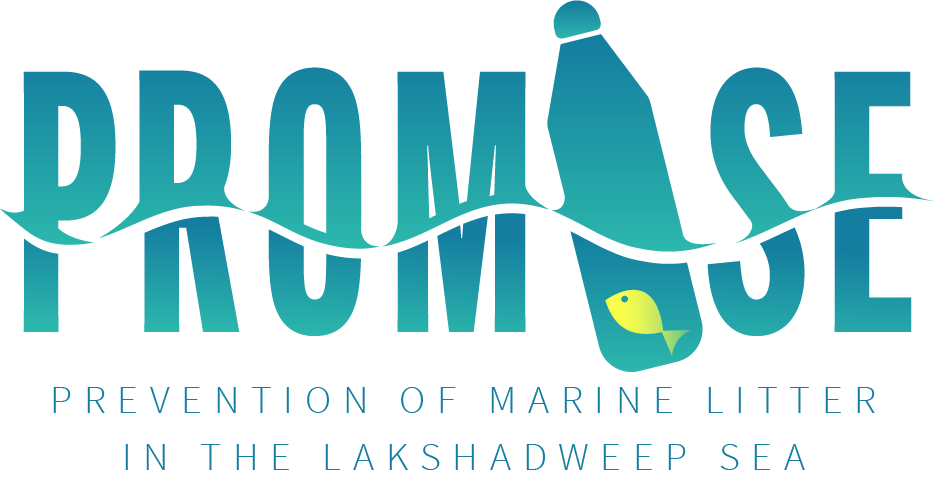MALDIVES: Pilot Material Flow Analysis in Hulhumale Phase 2, Maldives
| Date |
Date
|
Overview of Activities
The PROMISE’s Material Flow Analysis (MFA) project team from Adelphi research GmbH and STENUM Asia developed a data collection methodology in June 2021. The methodology was first tested in India (Paruvar beach) in November 2021. The team then developed a pilot in the Maldives to further test the methodology with a focus on imagery data collection. The Maldives National University (MNU) and Parley for the Oceans- Maldives (Parley) identified a 400m long section of the beach in Hulhumale Phase 2, North Malé Atoll, Maldives (4°13’29.2’’ N, 73°32’52.7’’E) as a suitable location.
As a first step, imagery sampling via drone was carried out on the entire stretch of the beach. This allowed the recording of HD images of the entire beach to observe the litter present on the beach’s surface. Afterwards, a manual collection and analysis of the plastic litter in the 3 designated segments were conducted. The results of the drone survey were then interpolated with the data collected from the three manual samplings to quantify the total amount of waste present on the entire beach.
Key Observations
PROMISE Team experts from Adelphi, MNU, and Parley conducted an inspection of the selected Beach to identify the three potential representative segments (one high, one medium, and one low polluted) for the manual sampling. The segments selected were approximately 20 x 10 meters and marked with a signalization tape to allow the recognition of the pictures collected by drone. Once the segments were marked the imagery data collection started. Then, the team started a manual collection of litter from each segment and categorized it into groups based on its nature and use.
The manual and aerial samplings allowed the PROMISE team to collect insights regarding the type of waste present on the beach location. The analysis showed that the most common waste types present on the Hulhumale Phase 2 beach are plastics, paper and cardboard, and Styrofoam. Of these, the majority can be considered disposable items. For example, PET plastic bottles and caps, and sweet wrappers/supari packets were found in high numbers in all three sampled segments.
Outcomes of Stakeholder Interviews
The Maldives National University Team interviewed different stakeholders in the area of Hulhumale between May and June 2022 including SMEs connected to the tourism sector, stakeholders from the solid waste management units or public waste collection service providers and NGOs.
Interviews from different Cafés and Restaurants near the beach area reviled that during the time of the interview, only plastic waste was being segregated and the other wastes were mixed. However, this was expected to change from the 1st of June 2022 following the new waste management regulations. The waste generated from the SMEs was collected by Waste Management Corporation Limited (WAMCO) at a price ranging from 600-900 MVR/ month. Some of the restaurants were already taking up sustainable initiatives like avoiding sing-use plastic, using metal straws onsite, and using paper straws and cups for takeaway, while others plan to incorporate more changes like using glass bottles in the future.
According to WAMCO, the waste collection service providers in Hulhumale Phase 2, 172 tonnes of waste is generated in total between Phase I and II. In general, waste segregation is not practised in Hulhumale's Phase I and II. However, the new regulations starting from June require the waste to be segregated into general, plastic, glass and metal. In Hulhumale, 266 commercial facilities are registered for waste collection for a fee of 900 MVR/month if the generated amount is up to 1 bag/day (the rate increases with the increase in the volume of waste). WAMCO also mentioned that they had just started carrying out daily clean-up of beaches as part of the routine city cleaning which was previously handled by the Housing Development Corporation (HDC).
Conclusions and Lessons Learnt
Hulhumale Phase 2 Beach, has only a few tourism-connected SME activities present on it given the relatively new development of the area. The people frequenting the beach area are also mainly locals. The solid waste management practices that contribute to littering and dumping of waste on the Hulhumale phase beach require better municipal services and increased awareness of the community. There are currently no waste management regulations that are applicable to liveaboards and boats which is one of the main sources of waste ending up on the beach. It would be an effective intervention to regulate the waste management practices of vessels by introducing proper collection and waste management procedures or SOPs.
Parley Maldives suggested to introduce proper collection and an SOP for local tourism entities as the type of interventions required to reduce the littered waste on the beaches. Save the Beach Maldives emphasizes on the need for facilitation by the government and make managing waste the easiest practice to follow by the community.




